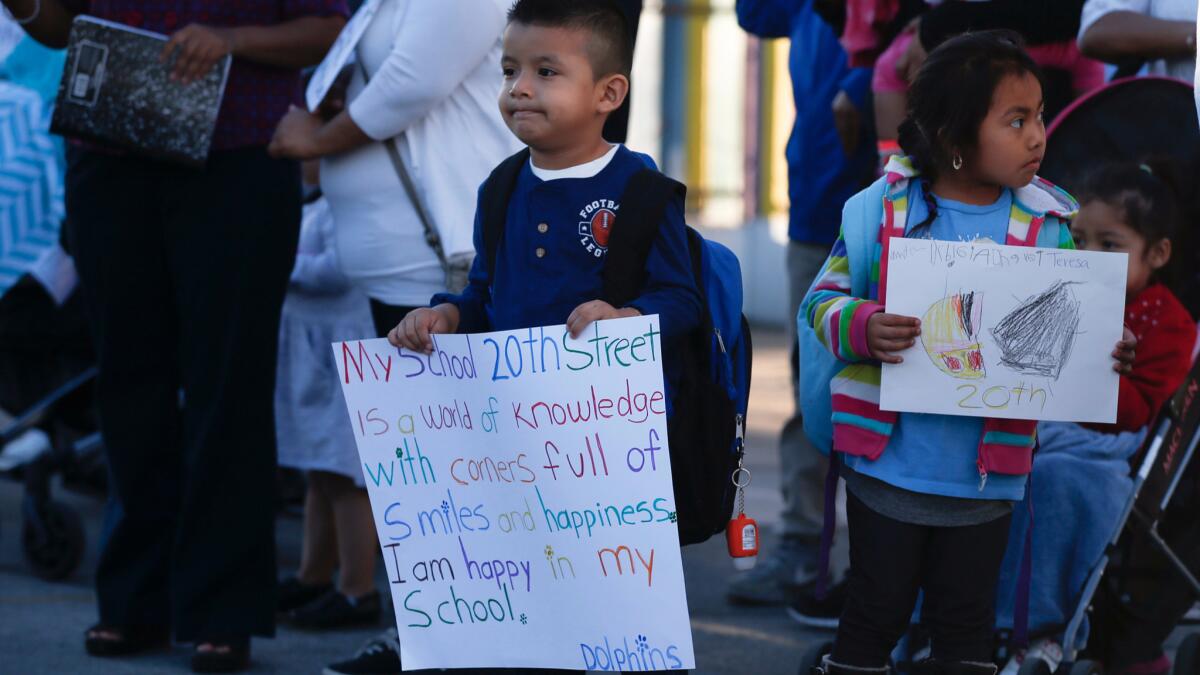After months of negotiations, a nonprofit will manage 20th Street Elementary School

- Share via
A dispute over the state’s parent trigger law and control of a Los Angeles elementary school were resolved Tuesday in a settlement with the L.A. school district and a group representing parents.
Under the pact, operations at 20th Street Elementary School will be turned over to the nonprofit Partnership for Los Angeles Schools this fall. Under the agreement, the L.A. Unified School District will give 20th Street some funding for several additions: a math curriculum that the Partnership is rolling out, an assistant principal for more “instructional and programmatic support,” a coordinator for English learners and some discretionary money.
The principal, Mario Garcielita, will remain for the 2016-17 school year, and the Partnership and district will decide together whether to keep him after that, according to the agreement.
The Partnership’s management of the school represents a compromise. Its 17 campuses operate under the district’s union agreements and are not charter schools, which are publicly funded but often privately run. That’s a plus for L.A. Unified, which has tried to stem the flow of students — and the state funding that comes with them — to charters.
The agreement will allow the district and parents to “continue to strengthen the academic supports, social-emotional learning opportunities and parent-engagement programs” at the school, L.A. Unified Supt. Michelle King said in a statement.
But United Teachers Los Angeles President Alex Caputo-Pearl wrote in an email that he is “troubled” by the agreement because the school’s faculty and many parents have not shown support for the Partnership taking control of the school.
“One hundred percent of the faculty, which has been working collaboratively with an energetic principal implementing an improvement plan … signed a letter against [Partnership] involvement,” Caputo-Pearl said.
Parents and organizers had filed a petition with signatures representing 58% of parents under the state’s parent trigger law, which allows parents to take control in deciding who will run a low-performing campus. District officials had said the petition was not valid. The parents, with the pro bono help of attorney Mark Holscher, threatened to sue the district for control.
Allowing the district to remain involved is a step below the level of independence the parent trigger leaders wanted, said Lupe Aragon, one of the parent organizers. But those parents also wanted to see changes quickly, she said.
“We didn’t want to wait another two years for the courts,” Aragon said. “At least it was going to be sooner than later.”
The Partnership sent its vision for running the school to the parents earlier this year, after the petition was filed. Aragon and other parents then visited Partnership schools and talked to families, Aragon said. She likes that the district will no longer have complete control over the school, and that the Partnership will implement new curricula and supervise the principal, she said.
Although the union contracts will remain in effect, the union had opposed any expansion of the Partnership over issues at its existing campuses in a June 21 letter to King.
Examples of problems alleged by the union include failure to abide by the contract, lack of collaboration, an incomplete safety plan and the use of resources for new programs while “failing to supply necessary basic classroom supplies.” The union also accused the Partnership of targeting higher-salaried veteran teachers for discipline.
The Partnership has defended its practices as above-board and appropriate.
The Partnership was a fallback plan of then-Mayor Antonio Villaraigosa after courts blocked his attempt to take over L.A. Unified in 2007. He and others set up the Partnership to take control of some of the district’s lowest-performing schools. Initially, teachers at a school had to approve becoming a Partnership campus. Later, the Partnership expanded by making arrangements directly with L.A. Unified. The group’s performance has been mixed, but leaders of the 20th Street petition to leave L.A. Unified were impressed.
Not all parents wanted the change. During a protest in May, some parents said they didn’t see a need for an overhaul and showed support for existing management.
The organizing group, Parent Revolution, has a controversial history. Its founders helped push through the state law that allows parents to target a principal, replace the entire staff, or turn over a campus to a charter-school organization.
Several L.A. schools have been touched by the efforts of Parent Revolution.
At 24th Street Elementary, L.A. Unified ultimately endorsed a parent vote that resulted in a campus split between a district-run academy and a charter. At Weigand Elementary, parents petitioned to remove the principal, but the teaching staff departed in protest. L.A. Unified replaced the staff and continued to operate the campus. At two others schools, parents abandoned their petition after the district agreed to address their complaints.
Parent Revolution has also organized outside L.A. Unified.
The group’s initial effort in Compton stalled in litigation. More successful was the controversial charter conversion of Desert Trails Elementary in Adelanto. Academic performance has improved, but local officials oppose the charter retaining control.
Reach Sonali Kohli at [email protected] or on Twitter @Sonali_Kohli.
Twitter: @howardblume
UPDATES:
5:41 p.m.: This article was updated with a quote from L.A. Unified Supt. Michelle King.
This article was originally published at 5:32 p.m.
More to Read
Sign up for Essential California
The most important California stories and recommendations in your inbox every morning.
You may occasionally receive promotional content from the Los Angeles Times.












